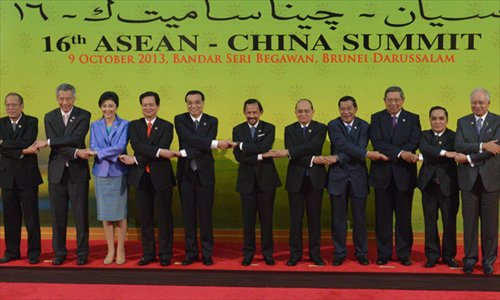Li calls for peaceful South China Sea

Chinese Premier Li Keqiang (fifth left) and leaders from the Association of Southeast Asian Nations (ASEAN) attend a group photo during the 16th ASEAN-China Summit on the sidelines of the 23rd summit of the ASEAN in Bandar Seri Begawan, Brunei on Wednesday. Photo: AFP
Chinese Premier Li Keqiang Wednesday called for a South China Sea of "peace, friendship and cooperation" in a meeting with the leaders of the 10-member Association of Southeast Asian Nations (ASEAN), saying that China and ASEAN should actively discuss the signing of a treaty of friendship.
"A peaceful South China Sea is a blessing for all," he said at the 16th China-ASEAN leaders' meeting in Brunei. "We need to work together to make the South China Sea a sea of peace, friendship and cooperation."
Li said a treaty on good-neighborliness, friendship and cooperation between China and ASEAN would steer bilateral relations forward.
Li arrived in Brunei Wednesday on his first visit to Southeast Asia since becoming premier in March and he will also attend the 16th ASEAN-China, Japan and South Korea leaders meeting and the eighth East Asia Summit.
On Wednesday, the first ASEAN-US summit also opened in Brunei with US Secretary of State John Kerry leading the US delegation after US President Barack Obama cancelled his trip.
"The partnership that we share with ASEAN remains a top priority for the Obama administration," Kerry said at the gathering.
One senior official traveling with Kerry said he would be encouraging the ASEAN countries to continue to work "for enhanced coherence and unity" among themselves to bolster their position with China, the AP reported.
The report said China is angered by what it sees as US interference after Washington announced it had a national security interest in keeping the South China Sea lanes open and peacefully resolving disputes based on freedom of navigation.
In a joint written interview with media from ASEAN nations ahead of his visit to Brunei, Li said, as a big trading nation, China depends heavily on the unimpeded access and safety of international sea lanes and China places high importance on the freedom of navigation in the South China Sea.
The truth is, he stressed, that territorial disputes in the South China Sea have not had any effect on international shipping lanes.
In his meeting with Kerry during the UN General Assembly two weeks ago, Chinese foreign minister Wang Yi urged the US to look at and deal with the issue objectively and fairly, and refrain from any word or deed that may aggravate disputes or complicate the situation.
Lee Chian Siong, director for Community Affairs Development of the ASEAN Secretariat, told the Global Times that China and ASEAN already made some progress on their negotiations in promoting a code of conduct in the South China Sea, but it is hard for the two sides to reach final consensus on it at the summit.
The ninth Joint Working Group Meeting on the Implementation of the Declaration on the Conduct of Parties in the South China Sea (DOC) was held last month and China and ASEAN officials approved a working plan for implementing the DOC from 2013 to 2014.
Lee said it is better for relevant parties to carefully continue their negotiations than rush for a code of conduct that only exists in that form.
There is deep and traditional friendship between China and Southeast Asian countries that is difficult to be swayed by external forces, Zhu Zhenming, a deputy director of the Southeast Asia Research Institute affiliated with the Yunnan Academy of Social Sciences, told the Global Times.
"Although there are sea disputes between China and ASEAN countries, Chinese leaders' visits to the region showed that relations were not affected by the disputes and the US Asia pivot strategy," he said.
Li also said Wednesday that China and ASEAN should start the process of establishing an "upgraded version'' of the China-ASEAN free trade area, calling for bilateral trade to be more than doubled to $1 trillion by 2020.
China is now ASEAN's largest trading partner, while ASEAN ranks as China's third-largest trading partner.
Zhuang Guotu, head of the Center for Southeast Asian Studies at Xiamen University, told the Global Times Southeast Asia has always been among China's top diplomatic priorities.
"Chinese leaders' trips to the region reaffirm such a policy because without handling relations with neighboring countries, China will face difficulty in its relations with big powers," he said.
Premier Li's remarks on the treaty and the free trade zone means China is now nailing down the details of its cooperation with countries in the region and further positioning its role in the Asia-Pacific," Zhuang said.
Agencies contributed to this story